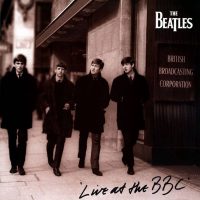
Recorded: 1 June 1963
Producer: Terry Henebery
Released: 30 November 1994 (UK), 5 December 1994 (US)
Available on:
Live At The BBC
Personnel
John Lennon: vocals, harmonica, rhythm guitar
Paul McCartney: bass
George Harrison: lead guitar
Ringo Starr: drums
The Beatles recorded two versions of ‘I Got To Find My Baby’, both for BBC radio, in June 1963.
It was written by Peter Clayton as ‘Gotta Find My Baby’, and released under the name Doctor Clayton in 11 November 1941. Other artists to record the song include BB King (1952) and Little Walter (1954).
Chuck Berry released ‘I Got To Find My Baby’ as a single in the US in 1960, coupled with the b-side ‘Mad Lad’, although it failed to chart. It is likely that The Beatles based their version on Berry’s recording, although it was not issued as a single in the UK.
The Beatles played many Berry songs live in their earlier years, with John Lennon taking lead vocals on the majority. Lennon also played the harmonica on their version of ‘I Got To Find My Baby’.
In the studio
The Beatles first recorded ‘I Got To Find My Baby’ on 1 June 1963 at the BBC Paris Studio, London, for the second Pop Go The Beatles radio show.
It was first broadcast on 11 June, and later released on the Live At The BBC collection.
The Beatles returned to ‘I Got To Find My Baby’ on 24 June 1963, with a performance for the Saturday Club programme. It was taped at the Playhouse Theatre in London, and was first broadcast five days later.
Lyrics
I’m gonna search this town
From door to door
The love I crave
I can’t find no more
I got to find my baby
I declare that ain’t no lie
I ain’t had no real good loving
Since that woman said goodbye
You know I hate to see the sun
Sinking to the west
’Cause I know my whole life’s
Gonna be one solid mess
I got to find my baby
I declare that ain’t no lie
I ain’t had no real good loving
Since that woman said goodbye
Well ever since the day
That she said we were through
I’ve been nervous
And shook up too
I got to find my baby
I declare that ain’t no lie
I ain’t had no real good loving
Since that woman said goodbye
Well I don’t care if the last thing
I ever do in my life
I’m gonna find that little woman
Make her my wife
I got to find my baby
I declare that ain’t no lie
I ain’t had no real good loving
Since that woman said goodbye


Lennon played a harp not harmonica
Lennon said so on the preceding track love these goon shows
A blues harp is a diatonic harmonica (rather than the chromatic one that Lennon normally played on early Beatles records). I’ll leave the line-up as it is.
John never played a chromatisch harmonica, that’s a completely different instrument. John played a bluesharp.
He definitely did play a chromatic on some recordings. Here’s some info you might find useful: https://www.patmissin.com/ffaq/q29.html
Thank you!
A Chuck Berry song that was not a big hit for him in the US. The flip side of the original single has a great slide guitar instrumental called “Mad Lad”. Check it out. The story goes that Berry used a Zippo lighter for a slide…
You’re right about the harp and harmonica. Chuck rewrote a Little Walter song of the same name. https://www.youtube.com/watch?v=zT6Z8j8wRX0
The original version was recorded by Doctor Clayton for Bluebird in 1941.
It was later recorded by B. B. King (RPM, 1952), Little Walter (Checker, 1954) and Chuck Berry (Chess, 1960), among others.
Thank you! I didn’t know about the history of this, but I’ll amend the article. It’s normally credited to Chuck Berry (including on Live At The BBC), so my guess is not many people know that Clayton wrote it.
You are welcome.
Berry’s version was also available on his fourth Chess album, “Rockin’ At The Hops”, released in 1960. It was the opening song for side two.
In the UK, it was one of the songs included on “Chuck Berry” (Pye GGL 0352), an album released in 1962, so maybe that was their source for Berry’s version of the song.
https://www.discogs.com/Chuck-Berry-Chuck-Berry/release/9735065
And Mad Lad would, then, inspire then, as a great instrumental, on “Flying”!! The same rhythm and the beats on the compasses!
I think the line is, “I know my life is going to be one solid quest”
“One solid mess”…
Harmonica solo is similar to the one played in Little Child.
John did the majority of the lead vocals on the Chuck Berry songs, but George did “Roll Over Beethoven” and Paul did “Little Queenie”.
Speaking of the latter song, the Star-Club songs (the ones that are only on the Star-Club tapes) should be on this list too, for a number of reasons. First, they’re unavailable anywhere else. Second, they were a legitimate legal release for many years. Third, one song is of special importance, “Falling In Love Again”. The song was originally associated with Marlene Dietrich and the lyrics were in German. Paul wrote his own set of English lyrics for the song. A lot of people don’t know that. He should have a co-writer’s credit.